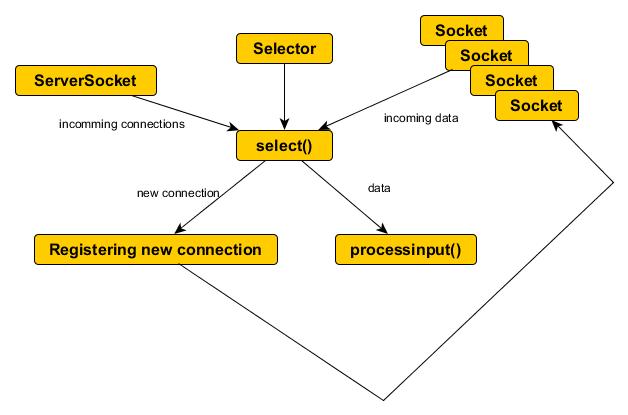Table of Contents
Elvi különbség a blokkolt és nem-blokkolt megközelítés között
Olvasnivaló:
Elvi váz
ServerSocketChannel serverSocketChannel = ServerSocketChannel.open(); serverSocketChannel.socket().bind(new InetSocketAddress(9999)); serverSocketChannel.configureBlocking(false); // ez a sor jelzi a blokkolásmentes működést while(true){ SocketChannel socketChannel = serverSocketChannel.accept(); if(socketChannel != null){ // az összeköttetés létrejött } }
Nem blokkolt kliens példa
import java.io.IOException; import java.io.InputStream; import java.io.OutputStream; import java.net.Socket; import java.util.Random; public class Client implements Runnable { private String host; private int port; // Bounds on how much we write per cycle private static final int minWriteSize = 1024; private static final int maxWriteSize = 65536; // Bounds on how long we wait between cycles private static final int minPause = (int) (0.05 * 1000); private static final int maxPause = (int) (0.5 * 1000); // Random number generator Random rand = new Random(); public Client(String host, int port, int numThreads) { this.host = host; this.port = port; for (int i = 0; i < numThreads; ++i) { new Thread(this).start(); } } public void run() { byte buffer[] = new byte[maxWriteSize]; try { Socket s = new Socket(host, port); InputStream in = s.getInputStream(); OutputStream out = s.getOutputStream(); while (true) { int numToWrite = minWriteSize + (int) (rand.nextDouble() * (maxWriteSize - minWriteSize)); for (int i = 0; i < numToWrite; ++i) { buffer[i] = (byte) rand.nextInt(256); } out.write(buffer, 0, numToWrite); int sofar = 0; while (sofar < numToWrite) { sofar += in.read(buffer, sofar, numToWrite - sofar); } System.out.println(Thread.currentThread() + " wrote " + numToWrite); int pause = minPause + (int) (rand.nextDouble() * (maxPause - minPause)); try { Thread.sleep(pause); } catch (InterruptedException ie) { } } } catch (IOException ie) { ie.printStackTrace(); } } static public void main(String args[]) throws Exception { new Client("localhost", 4444, 3); } }
Nem blokkolt szerver példa
public class Server implements Runnable { // The port we will listen on private int port; // A pre-allocated buffer for encrypting data private final ByteBuffer buffer = ByteBuffer.allocate(16384); public Server(int port) { this.port = port; new Thread(this).start(); } public void run() { try { // Instead of creating a ServerSocket, // create a ServerSocketChannel ServerSocketChannel ssc = ServerSocketChannel.open(); // Set it to non-blocking, so we can use select ssc.configureBlocking(false); // Get the Socket connected to this channel, and bind it // to the listening port ServerSocket ss = ssc.socket(); InetSocketAddress isa = new InetSocketAddress(port); ss.bind(isa); // Create a new Selector for selecting Selector selector = Selector.open(); // Register the ServerSocketChannel, so we can // listen for incoming connections ssc.register(selector, SelectionKey.OP_ACCEPT); System.out.println("Listening on port " + port); while (true) { // See if we've had any activity -- either // an incoming connection, or incoming data on an // existing connection int num = selector.select(); // If we don't have any activity, loop around and wait // again if (num == 0) { continue; } // Get the keys corresponding to the activity // that has been detected, and process them // one by one Set keys = selector.selectedKeys(); Iterator it = keys.iterator(); while (it.hasNext()) { // Get a key representing one of bits of I/O // activity SelectionKey key = (SelectionKey) it.next(); // What kind of activity is it? if ((key.readyOps() & SelectionKey.OP_ACCEPT) == SelectionKey.OP_ACCEPT) { System.out.println("acc"); // It's an incoming connection. // Register this socket with the Selector // so we can listen for input on it Socket s = ss.accept(); System.out.println("Got connection from " + s); // Make sure to make it non-blocking, so we can // use a selector on it. SocketChannel sc = s.getChannel(); sc.configureBlocking(false); // Register it with the selector, for reading sc.register(selector, SelectionKey.OP_READ); } else if ((key.readyOps() & SelectionKey.OP_READ) == SelectionKey.OP_READ) { SocketChannel sc = null; try { // It's incoming data on a connection, so // process it sc = (SocketChannel) key.channel(); boolean ok = processInput(sc); // If the connection is dead, then remove it // from the selector and close it if (!ok) { key.cancel(); Socket s = null; try { s = sc.socket(); s.close(); } catch (IOException ie) { System.err.println("Error closing socket " + s + ": " + ie); } } } catch (IOException ie) { // On exception, remove this channel from the // selector key.cancel(); try { sc.close(); } catch (IOException ie2) { System.out.println(ie2); } System.out.println("Closed " + sc); } } } // We remove the selected keys, because we've dealt // with them. keys.clear(); } } catch (IOException ie) { System.err.println(ie); } } // Do some cheesy encryption on the incoming data, // and send it back out private boolean processInput(SocketChannel sc) throws IOException { buffer.clear(); sc.read(buffer); buffer.flip(); // If no data, close the connection if (buffer.limit() == 0) { return false; } // Simple rot-13 encryption for (int i = 0; i < buffer.limit(); ++i) { byte b = buffer.get(i); if ((b >= 'a' && b <= 'm') || (b >= 'A' && b <= 'M')) { b += 13; } else if ((b >= 'n' && b <= 'z') || (b >= 'N' && b <= 'Z')) { b -= 13; } buffer.put(i, b); } sc.write(buffer); System.out.println("Processed " + buffer.limit() + " from " + sc); return true; } static public void main(String args[]) throws Exception { new Server(4444); } }

